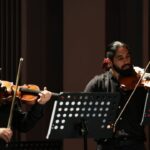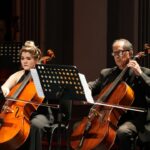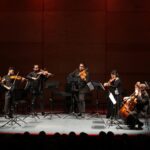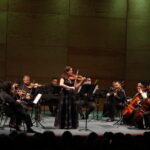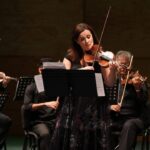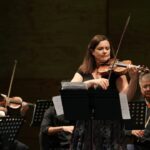On the night of Friday, March 17th, at the Ángela Peralta Theater, the Camerata Mazatlán presented the Brandenburg Concerto No. 3 by Johann Sebastian Bach and The Four Seasons by Antonio Vivaldi.
The Four Seasons is considered the most important work of the Baroque period, it is a descriptive or programmatic composition that evokes, through elements of musical language, different aspects of the seasons of the year.
Under a splendid correspondence of each measure, the Camerata Mazatlán recreated through the strings the formidable sound represented by the natural and human elements that make up the work.
As a solo violinist, maestro Nina Farvarshchuk contributed her musical virtuosity and managed to take the audience, from the descriptive to the reflective, making them feel the joviality and vitality typical of spring, the calm of fatigue at the end of the day, the smallness experienced before the majesty of creation and the modest place that human beings occupy among the immensity of natural elements that characterize each season of the year.
Antonio Vivaldi composed about 770 pieces, including more than 400 concertos and about 46 operas. He is especially known, at a popular level, for being the author of the Four Seasons series of concerts for violin and orchestra.
Brandenburg Concerto No. 3 was performed under exciting movements and a strong rhythmic impulse that demand great virtuosity from the musicians, who testified to a high technical mastery of their instruments.
The work was executed by maestros Jéssica Delgado, Citlalli Cisneros, Arturo Romero Ramírez, Alain Valencia, Víctor Villalobos, Víctor Alonso Osuna, Pablo Mejía, Orlando Idrovo, Luis Corrales, Maximiliano Torres and Raziel Pineda.
The musical evening generated a casual competition on stage between both baroque jewels and the winners were the attendees.
More than 300 years later, Bach and Vivaldi transcend their time, and continue to arouse the admiration of the public.

